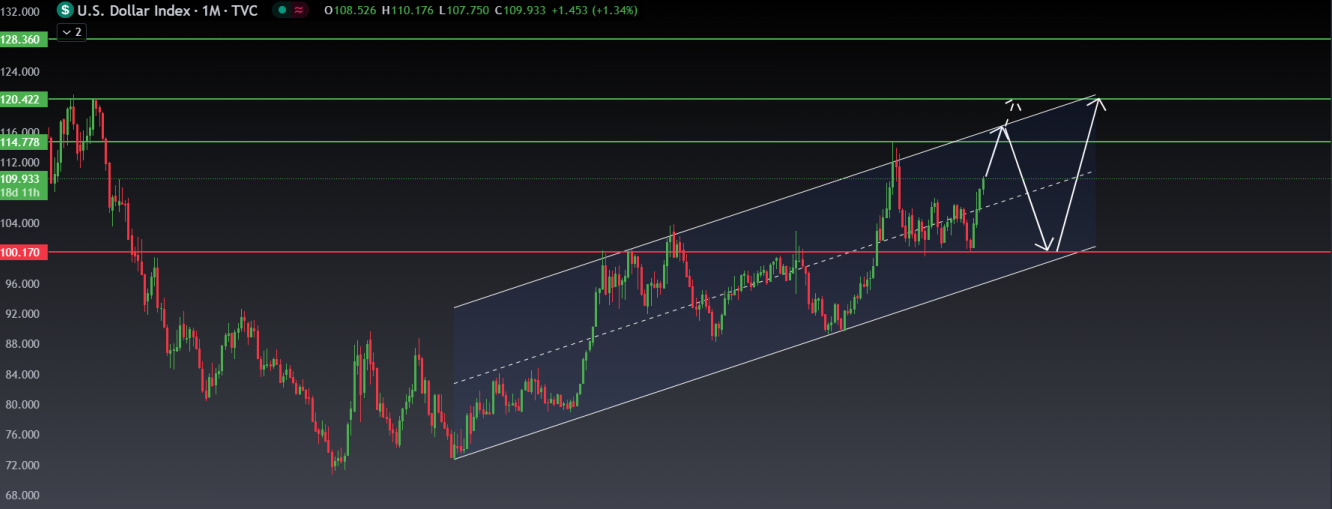US President-elect Donald Trump is serious about acquiring Greenland. The possibility of Greenland joining the US is hypothetical and potentially transformative for the global economy. The move has the potential to dramatically alter the balance of power in the world, with a significant impact on resource, currency, and equity markets.
This article examines how Greenland's integration into the US could affect the economic system and financial markets.
Geopolitical significance: The new Arctic leader
Greenland is not just a strategic point on the map but a true center of gravity for the world's powers, possessing abundant natural resources and crucial transportation routes that are increasingly accessible due to climate change. The region harbors reserves of 43 of the 50 minerals deemed "critical" by the United States, including perhaps the world's largest deposits of rare earth metals, except China.
These resources are strategically crucial for the production of military equipment and sustainable energy equipment. Wells off the coast of Greenland could contain as much as 52 billion barrels of oil, about 3% of the world's proven reserves. For the U.S., annexing Greenland would open access to unprecedented reserves of rare metals and hydrocarbons and strengthen its position in the global struggle for influence in the Arctic, where other powers continue to increase their activity
.

Current and possible sea routes in the Arctic
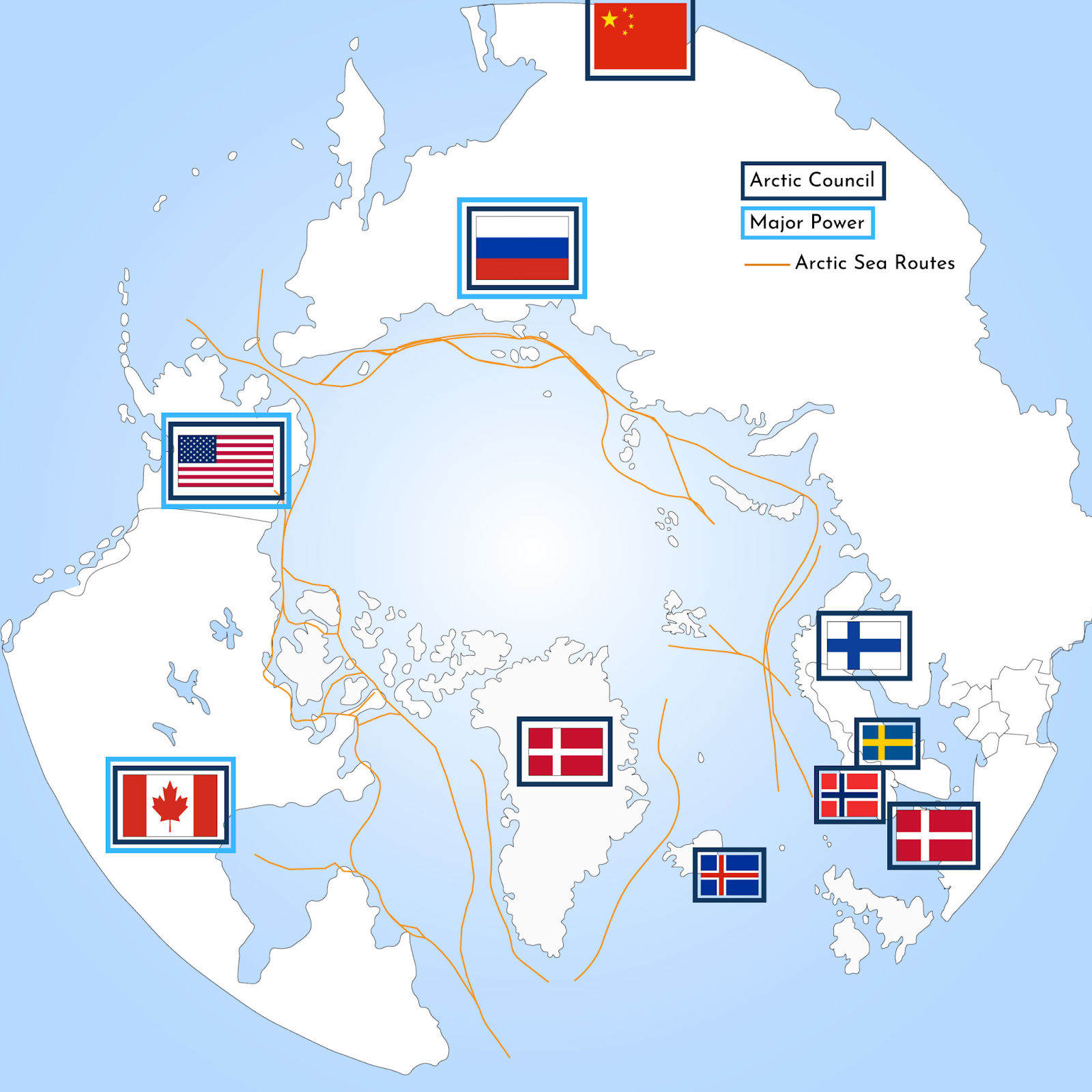
Influence of different countries in the Arctic
Economic potential of Greenland
- Natural resources
Greenland is a veritable treasure trove of rare earth metals such as neodymium, dysprosium, and terbium, essential for producing high-tech devices and renewable energy. These resources are critical to future technological advances, and their extraction would provide the U.S. with a strategic advantage, reducing dependence on China, which controls about 60% of the global market.
In addition, Greenland has significant oil and
natural gas
reserves that could lower global hydrocarbon prices and enhance U.S. energy security.
- Infrastructure Development
Successful integration of Greenland will require extensive development of its infrastructure, including transportation networks, energy facilities, and communications. This will create a high demand for construction materials, machinery, and labor, which will help the domestic economy grow and create new jobs. Investments in infrastructure will provide long-term benefits and support growth in key industries
Dollar win-win: Greenland as a catalyst for US financial strength
Greenland's accession could be a powerful incentive to strengthen the dollar's position as the world's primary reserve currency. The move would significantly expand US economic opportunities by providing access to the wealthiest reserves of rare earth metals, oil, and gas. These resources will reduce external dependence on suppliers such as China and strengthen the country's energy and industrial potential, creating a solid foundation for economic growth.
Such changes will significantly support the dollar for economic stability and confidence in the US. The dollar-strengthening positions in strategically important sectors, such as energy and high technology, will reduce risks to the economy and make the US currency even more attractive to investors. Against such changes, the
dollar index
(DXY), which reflects its strength against other currencies, is likely to show strong growth.
At the same time, the strengthening of the dollar may become a challenge for competing currencies. The economic pressure on global resource markets caused by US dominance in rare metals and hydrocarbon extraction has the potential to weaken the competitive position of other countries. This, in turn, could reduce the attractiveness of their currencies in global trade and investment.
Greenland's accession may also stimulate international capital flow to the US, as access to rare resources and infrastructure development in the region will create new investment opportunities. Increased interest in US assets would strengthen the dollar, expanding its role in international settlements and reserves.
Thus, Greenland could become a strategic and financial asset for the US, turning the dollar into an even more powerful instrument of global influence. This move's impact on currency markets will be a notable catalyst for changes in the global economic system.
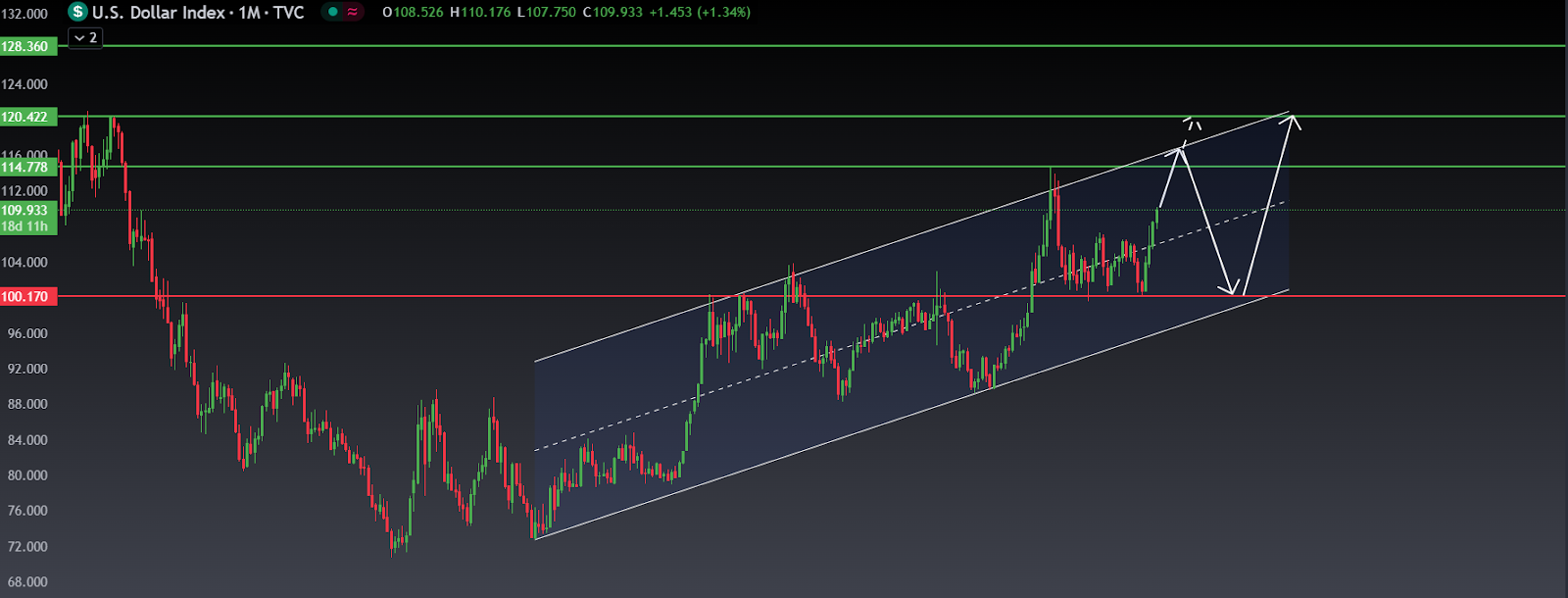
Possible development of USD after Greenland annexation
Based on the current chart of the
US Dollar Index
(DXY) and the addition of the hypothetical factor of Greenland joining the US, a forecast can be formed:
The dollar index (DXY) continues moving in an ascending channel, where the nearest resistance is 114. The key will be the fight with this level in the short term: if the price breaks through it and consolidates, a move to 120 is possible in the medium term. In case of failure or correction, a pullback to the channel's lower boundary near 100 is likely, which also fits into the current channel structure. It is too early to discuss a long-term breakout above 120, but the dynamics will depend on macroeconomic factors and Fed policy.
Arctic Oil: How Greenland's resources could change the global energy market
Greenland has enormous oil production potential, with reserves estimated at 52 billion barrels, about 3% of the world's reserves. If these resources are actively exploited, this could lead to oversupply in the global oil market and lower prices.
Potential Effects:
1. Oil prices:
With increased production in Greenland, oil prices could fall, especially if demand for hydrocarbons remains at current levels or declines due to a shift to alternative energy sources.
2. Impact on exporting countries:
Major oil exporters such as OPEC and Russia will face falling revenues and increased competition.
3. Consumers:
Lower prices benefit oil-importing countries such as India and EU countries, stimulating economic growth.
The development of oil fields in Greenland may become a key factor in changing the rules of the global energy market, strengthening the US position and creating new challenges for traditional oil exporters.
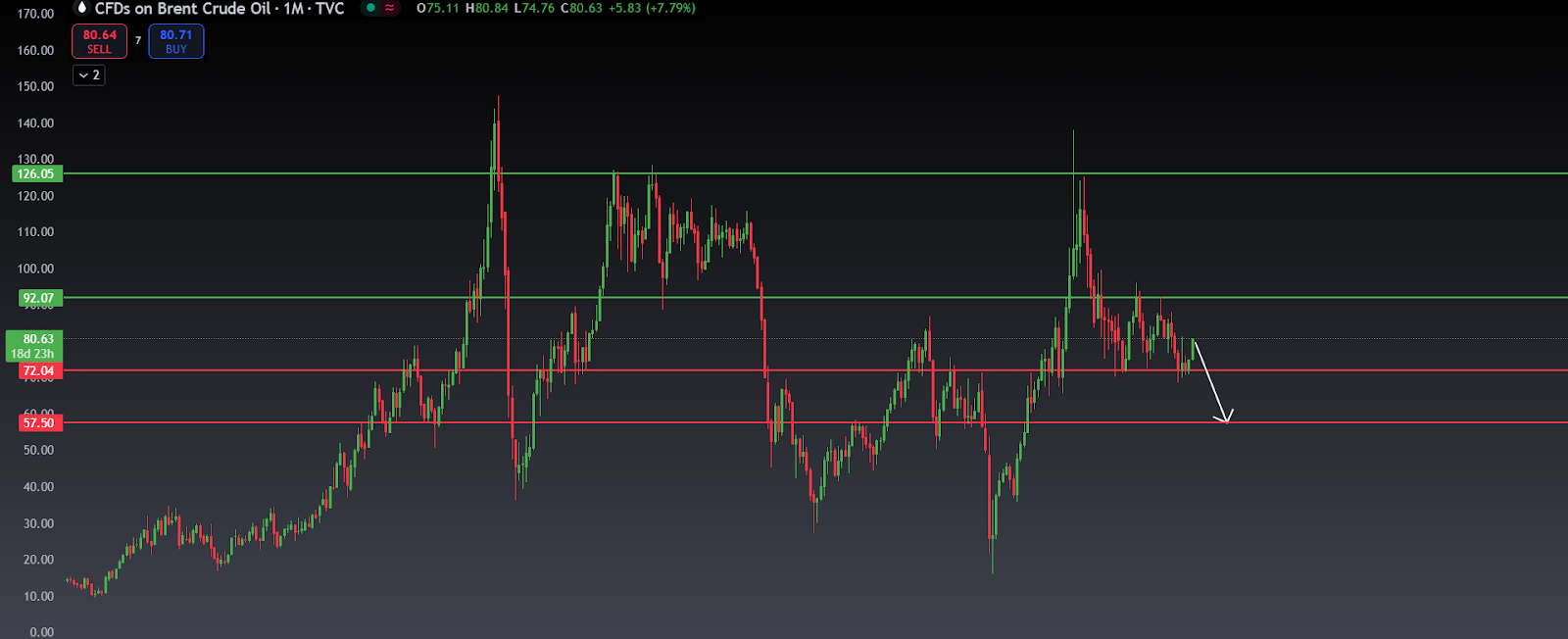
Active development of Greenland's oil resources
If the US starts actively developing Greenland oil resources, excess supply will be created in the world market.
In the short term, the market may react by falling prices, especially if current OPEC production levels remain unchanged.
The development of Greenland oil fields (subject to large investments and active development) may lead to a drop in prices to $57-72, as the US will be able to cover part of the world's demand for oil with its own resources.
Stock markets
Who stands to gain?
Energy companies:
Greenland's accession will open access to massive oil and gas reserves, benefiting major upstream corporations such as ExxonMobil (NYSE:
XOM
) and Chevron (NYSE:
CVX
). The development of new fields will strengthen these companies' positions in the global energy market.
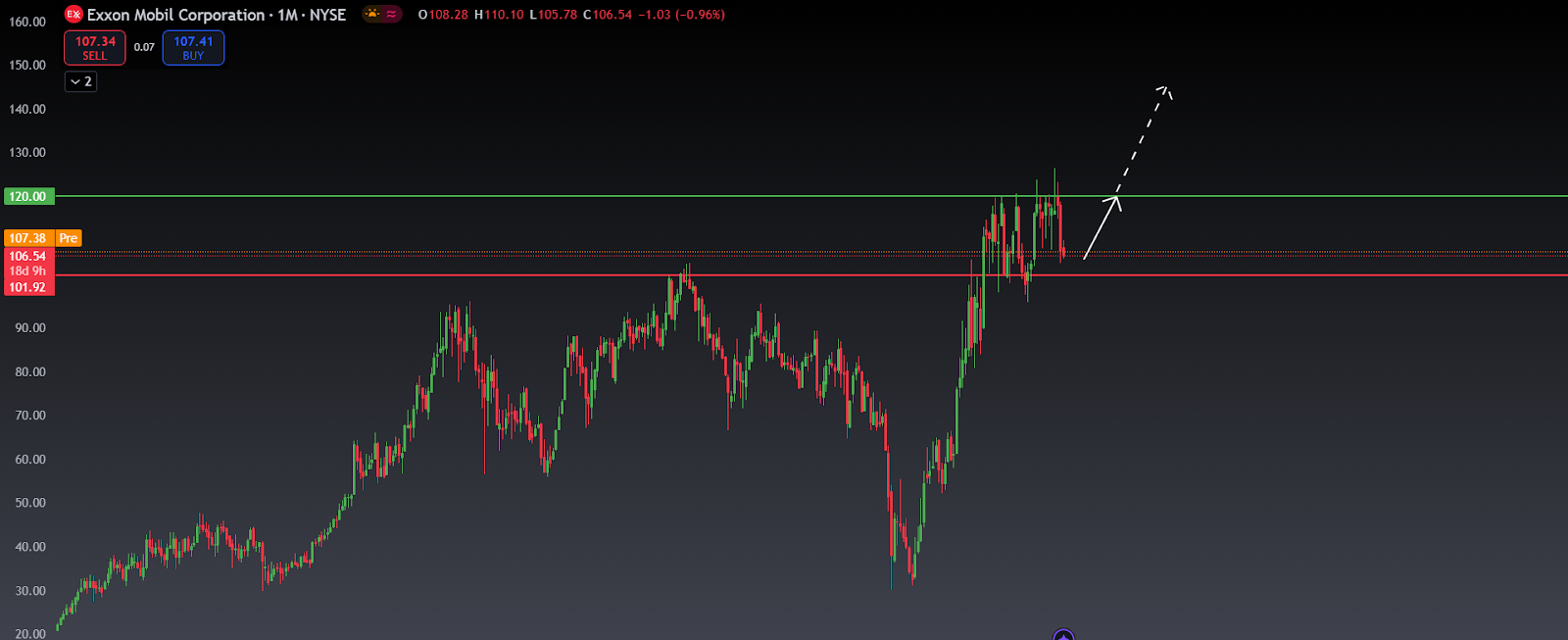
ExxonMobil's reaction to possible oil development in Greenland
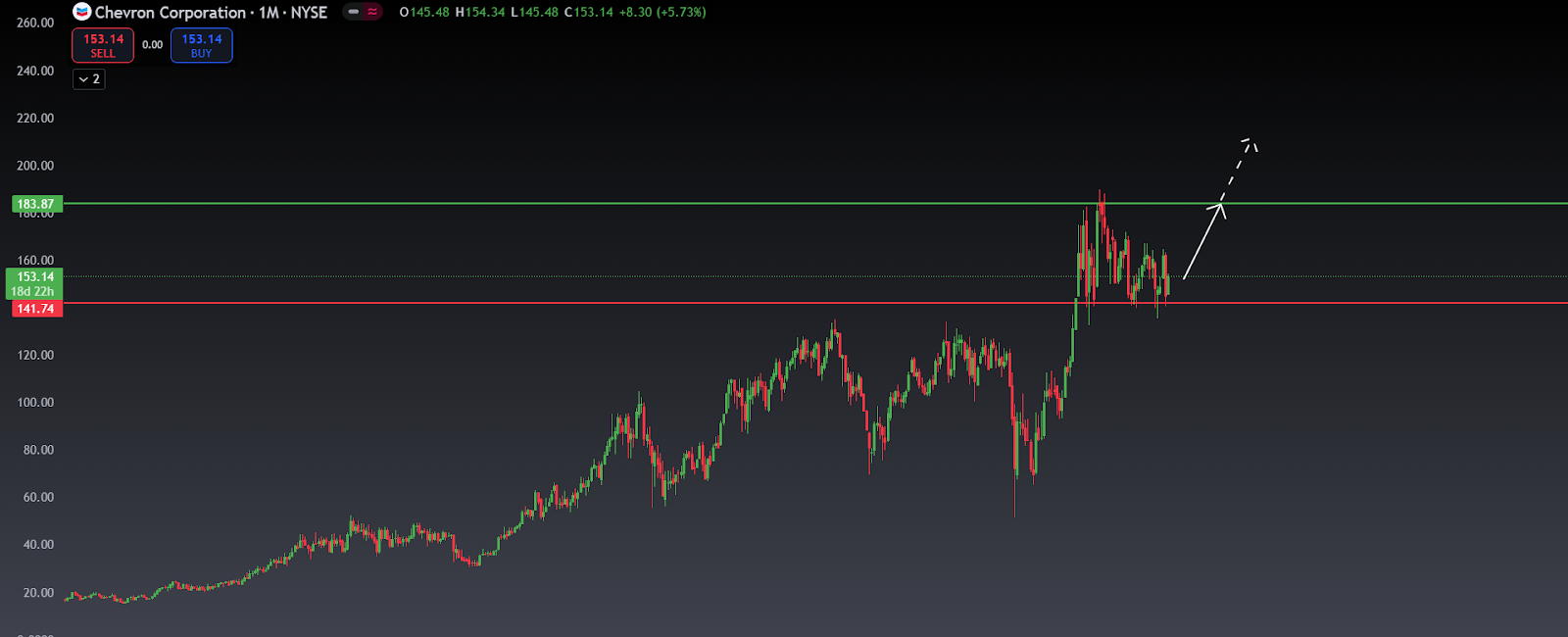
Chevron's reaction to possible oil development in Greenland
Technology companies:
Greenland is a rich source of rare metals such as neodymium, dysprosium, and terbium, which are essential for high-tech devices and renewable energy. Apple (NASDAQ:
AAPL
), Tesla (NASDAQ:
TSLA
), and other companies working in these areas could benefit from the availability of these materials. This would also allow the U.S. to reduce its dependence on China, which controls a significant portion of the global rare metals market.
Construction companies:
Infrastructure development in Greenland, which is necessary to integrate the region into the U.S., will open up new opportunities for Caterpillar (NYSE:
CAT
) and other companies involved in construction projects and equipment manufacturing. Investors may turn their attention to these companies, expecting demand for their products to increase.
Who will lose out?
Companies from US competitors: Countries not in an alliance with the US could face higher raw material costs and loss of supply. This will be particularly difficult for countries dependent on imports of rare metals and hydrocarbons.
Conclusion: Greenland as an economic springboard for the US
Greenland's accession to the US could be a historic event, changing the balance of power in the global economy. It would open new opportunities for the US, with access to valuable natural resources and a strengthened position in the Arctic.
However, such changes will also bring serious challenges: the need for large-scale investments, infrastructure development, and geopolitical tensions. As a result, financial markets will experience a wave of transformation, and some industries could benefit significantly.
